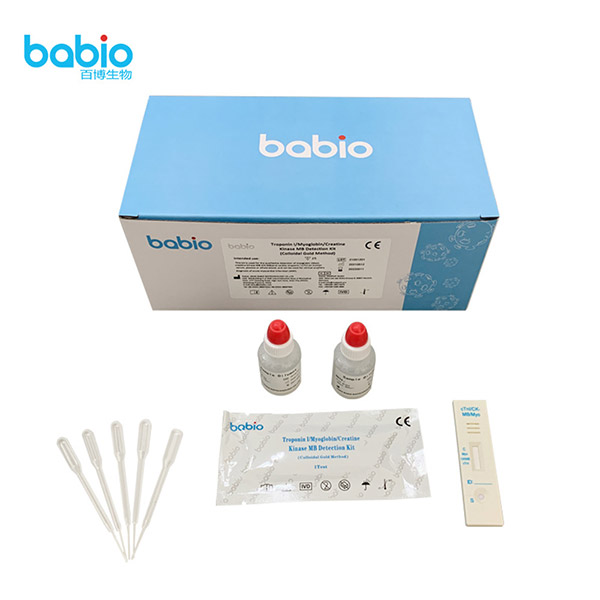
INTENDED USE
Troponin I/Myoglobin/Creatine Kinase MB Detection Kit (Colloidal Gold Method) is used for the qualitative detection of myoglobin (Myo), creatine kinase MB (CKMB)and cardiac troponin I (cTnI )in human serum, plasma or whole blood, and can be used for clinical auxiliary diagnosis of acute myocardial infarction (AMI).
This test is only provided for use by clinical laboratories or to health care workers for point of care testing, and not for at home testing.
The results of the test should not be used as the only basis for the diagnosis or exclusion of acute myocardial infarction. The diagnosis should be confirmed in conjunction with clinical symptoms or other routine testing methods.
SUMMARY AND EXPLANATION
Troponin is composed of three subunits of troponin I, T, and C. Together with troponin, they regulate the interaction between actin and myosin by regulating the activity of Ca2+ on rhabdominal actin ATPase. When the myocardium is injured, the cardiac troponin complex is released into the blood. After 4-6 hours, the increase can be detected in the blood, and the elevated troponin I can stay in the blood for 6-10 days, providing A longer detection period. Cardiac troponin I (cTnI) has a high degree of myocardial specificity and sensitivity, so it has become an ideal marker of myocardial infarction.
Myoglobin (Myo) is a binding protein composed of a peptide chain and a heme prosthetic group. It is a protein that stores oxygen in the muscle. The chest pain can be elevated as soon as 2 hours after the onset; severe congestive heart failure and cardiac surgery patients will also increase due to myocardial damage. Myoglobin is a sensitive indicator for the diagnosis of acute myocardial infarction, so myoglobin has become one of the current markers of myocardial infarction.
Creatine Kinase (CK) has four isoenzyme forms: muscle type (MM), brain type (BB), hybrid type (MB) and mitochondrial type (MiMi), of which MB type is mainly found in cardiomyocytes in. In
myocardial infarction, creatine kinase rises within 6 hours of onset, reaches a peak within 24 hours, and returns to normal within 3 to 4 days. Among them, creatine kinase isoenzyme MB has a high diagnostic specificity, so it has become one of the current markers of myocardial infarction.
Myo is an early and better indicator for the diagnosis of acute myocardial infarction (AMI). cTnI is a highly specific indicator for diagnosing AMI. Although CK-MB is not as early as Myo andnot as sensitive as cTnI, it can diagnose early reinfarction after AMI. There is a certain value. It is clinically proven that any single test result may be misdiagnosed or missed, and the combined test is more helpful for early and accurate diagnosis of AMI.
REAGENTS AND MATERIALS PROVIDED
The nominal formula for each medium is as follows:
1. The main components of the test card are: bottom plate, sample pad, marking pad, nitrocellulose membrane, absorbent paper and card housing;
2. The detection line is coated with cTnI monoclonal antibody, CK-MB monoclonal antibody, Myo monoclonal antibody, and the quality control line is coated with anti-rabbit IgG antibody .fixed on the nitrocellulose membrane.
3.The marking pad has cTnI monoclonal antibody, CK-MB monoclonal antibody and Myo monoclonal antibody coupled with colloidal gold.
MATERIALS PROVIDED
